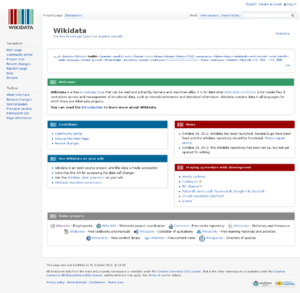Wikidata facts for kids
 |
|

Main page of Wikidata
|
|
|
Type of site
|
|
|---|---|
| Available in | Lua error in Module:Wd at line 1575: attempt to index field 'wikibase' (a nil value). |
| Owner | Lua error in Module:Wd at line 1575: attempt to index field 'wikibase' (a nil value). |
| Created by | Lua error in Module:Wd at line 1575: attempt to index field 'wikibase' (a nil value). |
| Website | Lua error in Module:Wd at line 1575: attempt to index field 'wikibase' (a nil value). |
| Alexa rank | ▼ 9,195 (February 2019[update]) |
| Commercial | No |
| Registration | Optional |
| Launched | 29 October 2012Lua error in Module:Wd at line 1575: attempt to index field 'wikibase' (a nil value). |
Wikidata is like a giant online library of facts. It's a special kind of wiki that stores information in a way that both people and computers can easily understand. Think of it as a central hub for all sorts of data on the internet.
This information is super useful! Other websites, especially Wikipedia and its sister projects, use the facts stored on Wikidata. It helps them keep their articles accurate and up-to-date. Wikidata was launched on October 29, 2012. It has grown a lot since then, with millions of pieces of information and thousands of people using it every day.
Contents
What is Wikidata?
Wikidata is a free and open knowledge base. This means anyone can use it, and anyone can help add or improve the information. It's built by a community of volunteers, just like Wikipedia.
How Data is Organized
Wikidata organizes information into "items." Each item represents a topic, like a person, a place, or a concept. For example, there's an item for "Earth," another for "Mars," and one for "Albert Einstein."
Items and Statements
Each item has a unique ID number, like Q111 for Mars. Inside each item, you'll find "statements." A statement is a piece of information about the item. For example, for the item "Mars," a statement might be "Mars has two moons."
Statements are made up of a "property" and a "value."
- The property describes the type of information (e.g., "number of moons").
- The value is the actual fact (e.g., "two").
This structured way of storing data makes it easy for computers to read and use the information. It's much more organized than just plain text.
Who Uses Wikidata?
Many different groups of people and computer programs use Wikidata:
- Wikipedia and Wikimedia projects: Wikidata provides facts for infoboxes, links between different language Wikipedias, and much more. This helps keep information consistent across all projects.
- Researchers: Scientists and academics can use Wikidata's structured data for their studies.
- Developers: Programmers can build tools and apps that use Wikidata's information.
- Anyone curious: If you want to find facts about almost anything, Wikidata is a great place to look!
Why is Wikidata Important?
Wikidata plays a big role in making information more accessible and useful on the internet.
Making Information Consistent
Imagine if every Wikipedia in every language had to store the same facts separately. If a fact changed, someone would have to update it everywhere! Wikidata solves this. When a fact is updated on Wikidata, all the Wikipedias that use that fact can get the new information automatically. This helps keep information consistent and accurate across many different websites.
Helping Computers Understand Data
Because Wikidata stores information in a structured way (with items, properties, and values), computers can "understand" the data much better than they can understand regular sentences. This is called "machine-readable" data. This ability allows for powerful tools and searches that can connect different pieces of information in new ways.
For example, a computer could easily find all planets that have two moons, or list all famous scientists born in a certain country, by looking at Wikidata's structured data.
Images for kids
-
Three statements from Wikidata's item on the planet Mars (Q111). Values include links to other items and to Wikimedia Commons.
See also
 In Spanish: Wikidata para niños
In Spanish: Wikidata para niños



